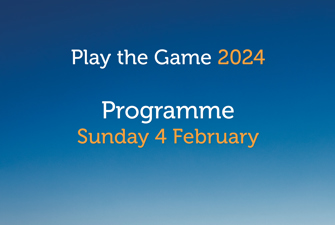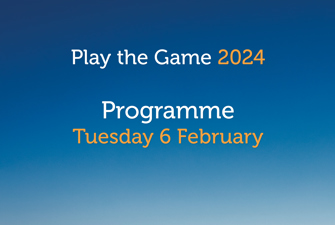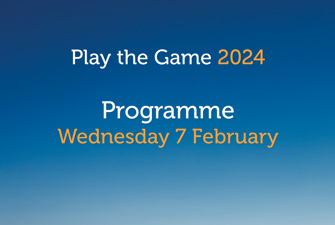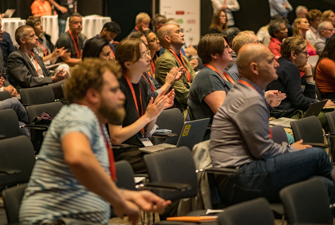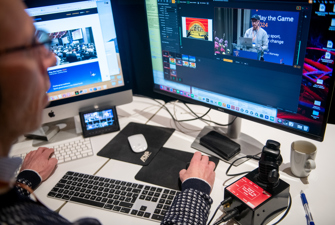09:00: Plenary session
Biased, bigoted, boorish? The global debate on Qatar 2022
Room: Olav Tryggvason
Chair: Hanne Marie Brevik
- 12 years of misdirection, and what it tells us about football's future
Nick Harris, editor, Sporting Intelligence, United Kingdom - The lived experience and social media narratives of the FIFA Men’s World Cup 2010‐2022: The voice of “another”
Kamilla Swart‐Arries, professor, Hamad Bin Khalifa University, Qatar - Have Qatar’s New Labor Laws Changed Anything for Workers? With No Press Freedom It’s Hard to Know
Craig LaMay, professor, Northwestern University in Qatar, Qatar - Qatar 2022: Securing a more balanced view from international media
Lars Haue‐Pedersen, managing director of sports practice, Burson Cohn & Wolfe (BCW), Switzerland - Did charges of orientalism derail the campaign for compensation?
Nicholas McGeehan, co‐director, FairSquare, France - Panel debate, Q&A
11.00: Coffee break
Challenging traditions: Sports governance in the Global South
11.45
Room: Olav Tryggvason
Chair: Eze Alloysius
- Enhancing football governance in Africa ‐ challenging traditional structures
Brian Wesaala, founder & CEO, The Football Foundation for Africa, Kenya - Incidence of institutional design, in the state of governance of national sports organizations
Julie Hortencia Gómez Solano, professor, Fundación Universitaria del Área Andina, Colombia - Citizen participation in the construction of public policy governance and legitimacy in sports
Ana María Arias Castaño, professor, Universidad de Ciencias Aplicadas y Ambientales (UDCA), Colombia - How FIFA's non‐interference policy enables autocratic rule: A case study of the Kenya football federation
Steffany Ndei, masters in sports ethics and integrity, KU Leuven, Belgium - AI‐Driven Capacity Enhancement: Empowering African Member Associations for Greater Independence
Mazin Eltayib Abusin, president, Sudan Youth Sports Authority, United Kingdom - Panel debate, Q&A
Doping: ‘It might be out of your body, but it is always on your mind’
11.45
Room: Tavern
Chair: Martin Dubbey
- Professor Richard McLaren and chief investigator Martin Dubbey discuss a game changing approach to anti‐doping, utilising cutting voice risk analysis technology.
- Panel debate, Q&A
The impact and legacy of mega sporting events
11.45
Room: Munkholmen/Kristiansten
Chair: Rasmus K. Storm
- Does international sporting success and major event hostships affect people’s willingness to fight?
Rasmus K. Storm / Tor Georg Jakobsen, head of research / professor, Play the Game / NTNU Business School, Denmark / Norway - The illusive pursuit of socio‐economic impacts and outcomes from publicly funded sport events
Marijke Taks, professor, University of Ottawa, Canada - London 2012: Fifteen years of managing impressions of the sporting legacy
Spencer Harris, professor, Colorado University Colorado Springs, United States - 2014 Fifa World Cup: The sporting legacy in Brazilian stadiums
Sabrina Furtado, researcher, Inteligência Esportiva Research Inst., Brasil - Equity Unleashed: Optimizing funds allocation in sport through Olympic Solidarity
Christoph Jankowski, manager, Warsaw School of Economics | NOC POL, Poland - Panel debate, Q&A
Addressing imbalances, reinventing systems
11.45
Room: Sverreborg
Chair: Troels Rasmussen
- The overlooked power imbalances of sport
Henrik H. Brandt, manager, Sports Hub Denmark (IdrætsPlatformen), Denmark - Towards a sound elite sports eco system: A case study in the Netherlands
Koen Breedveld, lector, The Hague University of Applied Sciences, Netherlands - Empowering the athlete voice to improve sport governance
Kelsey Sloan, global sports fellow, The Boarding School/Harvard Global Sports Initiative, USA - The new good story of sports? Critical discourse analysis of state sports administration's and central organisations' documents
Samuli Oja, researcher, Jamk University of Applied Sciences, Finland - Panel debate, Q&A
Matchfixing and sports manipulation: Athlete perspectives
11.45
Room: Austrått
Chair: Andy Brown
- Build trust to motivate reporting of match fixing
Corentin Segalen/Anna Semenova, primary coordinator of the MotivAction project/Project and policy officer, Autorité nationale des Jeux (French Gambling Regulatory Authority)/EUAthletes, France/Russia - Age manipulation in athletics: Challenges, consequences, and investigative strategies
Sanchita Aidasani, sports integrity analyst, Athletics Integrity Unit, Monaco - Explaining elite athletes' corruption behaviours: A comparative analysis of doping and match fixing
Rocco Porreca, senior lecturer, Oxford Brookes University, United Kingdom - Athlete‐centred integrity education for sport: Raising the quality and making a difference
Andrew Harvey, chair of the board, Gamechanger360, United Kingdom - Panel debate, Q&A
Social protection of athletes: Trapped between governmental responsibility and associational autonomy
11.45
Room: Brattøra
Chair: Ivana Pranjic
Session organised by the German Sport University Cologne
- Sport integrity and decent work for athletes – the ILO approach
Kirsten‐Maria Schapira‐Felderhoff, senior multilateral cooperation specialist, International Labour Organization (ILO), Switzerland/Germany - Implementing athlete‐specific social protection measures in European countries: what's in for governmental and elite sport actors?
Lorenz Fiege, research associate/PhD candidate, German Sport University Cologne, Germany - Preserving values, ensuring welfare: the association's perspective on athlete support
Sönke Schadwinkel, executive director, European Olympic Academies (EOA), Germany - Ensuring social protection and granting fair employment relations: Offers and constraints from an athlete’s perspective
Jürgen Mittag, head of the Institute of European Sport Development and Leisure Studies, German Sport University Cologne, Germany - Panel debate, Q&A
13.00: Lunch
ClearingSport: Sharing knowledge on sports crime from different perspectives
14.15
Room: Olav Tryggvason
Chair: Chiel Warners/Grit Hartmann
Lectures and hybrid workshop on the why, how and what in making an alternative agency against sports crime. Interventions will alternate with Q&A.
- Getting to a sports anti-corruption agency: the path of least resistance
Alex Phillips, consultant/administrator, Independent/WFRF, Switzerland - Delineation and economic ‘guesstimates’ of the dark side of sport
Wladimir Andreff, honorary professor, Ministry for sports & University Paris 1, France
Short interventions on specific perspectives:
- A journalistic approach to the costs of sports crime
Grit Hartmann, freelance journalist, Germany - How investigating finances via government and financial industry could help combat corruption in sport
Thomas J. Mangine, instructor, Association of Certified Financial Crime Specialists (ACFCS), United States - Sports crime as seen from a European police perspective (title tbc)
Arthur Whitehead, international liaison officer, Kingston University, United Kingdom - Why the effort for independent oversight shouldn’t be limited to the West
Eze Alloysius, executive director, PLAYYA Nigeria, Nigeria - Panel debate, Q&A including members of the ClearingSport Advisory Group (present and remotely)
How to fix and get away with it
14.15
Room: Tavern
Chair: Peter Forsberg
- How to fix a club football friendly and get away with it
Steve Menary, freelance journalist, United Kingdom - The facilitators helping sport promote illegal gambling
Andy Brown, editor, Sports Integrity Initiative, United Kingdom - Sporting integrity and legal pluralism
Cem Abanazir, lecturer, Manchester Metropolitan University, United Kingdom/Turkey - Gambling addiction among Nigerian youths: The silent killer!
Cosmas Ezoke, student, MAiSI, Nigeria - Manipulation of competitions in Brazil: Underestimated damage
Paulo Marcos Schmitt, integrity consulting, NOC Brazil CBC FPF, Brazil - Scouting for amateurs. How data companies target Belgian and European lower‐league games
Samindra Kunti, reporter, Josimar, Belgium - Panel debate, Q&A
Steps towards prevention of abuse in sport
14.15
Room: Munkholmen/Kristiansten
Chair: Tine Vertommen
- Safeguarding in sport: The need to protect athletes from institutions
Sanchita Aidasani, sports integrity analyst, Athletics Integrity Unit, Monaco - Challenging the norm(alised violence): Boundaries of coaching in sport
Zoe Elizabeth John, lecturer in criminology, Swansea University, United Kingdom - Volunteering and safeguarding: Ethical perspectives. Youth volunteer coaches and the prevention of harassment and abuse
Ophélie Delobel, MAiSI Alumni, Ethics of Sport and Integrity, Belgium - Safeguarding in esports?
Tsubasa Shinohara, human rights officer, Swiss Esports Federation, Switzerland - You are not a part of the solution, you are a part of the problem. A critical policy analysis of the IOC's safeguarding policies in the case of iran
Zohreh Abdollahkhani, PhD research fellow, University of South Eastern Norway, Norway - The importance of centering the voices of athletes with lived experiences of abuse in prevention efforts
Julie Ann Rivers‐Cochran, executive director, The Army of Survivors, United States - Panel debate, Q&A
The long way to sustainability in sport
14.15
Room: Sverreborg
Chair: Rikke Rønholt
- Wild Wild(fire) West: How climate change is changing sports
Madeleine Orr, assistant professor, University of Toronto, Canada - Playing with dual purposes: A study of professional football player's engagement in environmental activism
Frida Austmo Wågan, PhD student, Nord Universitet, Norge - Rewiring the greening of host cities: Birmingham 2022 and the prospects for social sustainability development
Seth Kirby, senior lecturer in sport management, Nottingham Trent University, United Kingdom - Solar panels don't score goals ‐ The long way to a sustainable Bundesliga
Maximilian Rieger, editor, Deutschlandfunk, Germany - Constant inconsistencies? Sport sponsorship meets sustainability
Ian Mengel, board member, PLAY!YA, Germany - Winter athlete's footprint
Hanne Marie Brevik/Anne Rognerud, Head of sport reporting/Senior sports reporter; Norwegian Broadcasting Corporation (NRK), Norway - Panel debate, Q&A
Protect and promote: The athlete perspective in anti‐doping
14.15
Room: Austrått
Chair: Faraz Shaehlei
- Protecting the precarious athlete: How athlete working conditions legitimise substance misuse in elite sport
Daniel Read, researcher, Loughborough University London, United Kingdom - The impacts of doping sanctions on athletes: The need for institutional support and continued research
Byron Juma, PhD candidate & Jules Woolf, assistant professor, University of Illinois‐Urbana‐Champaign, USA - Protecting ‘Protected Persons’: Legal and ethical issues impacting mandatory anti‐doping investigations into athlete support personnel
Marcus Mazzucco, adjunct lecturer, University of Toronto, Canada - Promoting athlete participation in anti‐doping education ‐ case study of a good‐practice approach
Marc Wonneberger, head of section 'Fight Against Doping‘, Federal Institute of Sport Science, Germany - Social media use in doping prevention and enforcement
Genevieve Birren, professor, SUNY Cortland, United States - From athlete voice to athlete agency: fostering athlete collaboration in service to clean sport
Allison Wagner, director of athlete & international relations, USADA, United States - Panel debate, Q&A
Women's sports: Participation, experiences and leadership
14.15
Room: Brattøra
Chair: Poul Downward
Session organised by Loughborough University London
- Womens participation in football in Europe
Paul Downward, professor, Loughborough University London, United Kingdom - Online experiences of female athletes
Lauren M. Burch / Andrea N. Geurin, senior lecturer / professor, Loughborough University London, United Kingdom - Developing female leaders in and through sport
Jacqueline Mueller, lecturer, Loughborough University London, United Kingdom - On the cost of wearing white shorts in women's sport
Alex Krumer, professor, Molde University College, Israel - Panel debate, Q&A
16.00: Coffee break
16.30: Plenary session
The Saudis are coming: How should world sport react to a new global sports order?
Room: Olav Tryggvason
Chair: James Corbett
- The power players behind Saudi Arabia's sports strategy
Stanis Elsborg, senior analyst, Play the Game, Denmark - Saudi Arabia's Public Investment Fund and its Links to Human Rights Abuses
Joey Shea, Saudi Arabia and UAE researcher, Human Rights Watch, Canada - First Qatar, Now Saudi Arabia: Time for Activists to Rethink
James M. Dorsey, academic, journalist, syndicated columnist, blogger, S. Rajaratnam School of International Studies and The Turbulent World with James M. Dorsey, Singapore/Germany/Morocco - A Half‐Full Perspective: The Arabian Peninsula and Saudi Investment in the Global Sport Industry
Mahfoud Amara, associate professor, Qatar University, Qatar - Saudi Arabia: The beautiful game meets a repressive regime
Lina Alhathloul, head of monitoring and advocacy, ALQST for Human Rights, Saudi Arabia - Panel debate, Q&A
18.30: Dinner
20:00: Plenary session
Sports journalism: A watchdog for society or a pet for showbiz?
Room: Olav Tryggvason
Chair: Henrik H. Brandt
- Journalist, activist or supporter: Which way forward for sports journalists?
Olof Lundh, journalist, Tv4, Sweden - Sports Broadcasting Rights vs. Journalism: Sleeping with the Enemy
Lúcio de Castro, reporter, Agência Sportlight de Jornalismo, Brazil - Unveiling Hard Truths: A Muslim Woman in Sports Media
Shireen Ahmed, journalist, CBC Sports, Canada - Locked gates, open secrets: Investigative journalism in FIFA land
Andreas Selliaas, journalist, Idrettspolitikk.no, Norway - Panellist: Tariq Panja, journalist, New York Times, United Kingdom
- Panellist: Tine Johansen, president, The Danish Union of Journalists, Denmark
- Panel debate, Q&A
